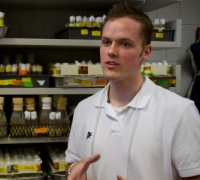
Jeff Nirschl spends the better part of his days with a fly-sucker around his neck. A long tube, in other words, that researchers use to transfer tiny fruit flies from one vial to another. “You put one end in your mouth,” Nirschl demonstrated, “and suck a fly into the tube, then gently blow it out where you want it. And no,” he laughed, “I’ve never accidentally sucked a fly into my mouth.” Nirschl is an undergraduate research assistant in Dr. Chun-Fang Wu’s neurogenetics laboratory, where, amid walls stacked with vials of living flies, he studies the interaction between healthy flies and those that have a genetic mutatation that, in humans, causes a type of Lou Gehrig’s disease. As he explains it, “The ‘sick’ flies are very short-lived, but when you house them with healthy flies, they live twice as long as they would otherwise. Twice! The social interactions can actually change gene expression, possibly helping the sick flies live longer.” Jeff’s enthusiasm is not only well-founded (insights about neurodegenerative disease are of major interest to the field), but it’s also infectious—give him ten minutes, and he’ll have you sporting a fly-sucker, too.
Like many CLAS students, Nirschl began with only a general interest—in biology: “I’ve always been curious about nature,” he says. “As a kid, I’d visit my grandfather’s farm and explore the surrounding fields and prairies looking for bugs and flowers I thought were cool.” Over the course of his four years in college, particularly during Introduction to Neurobiology with Dr. Jeffrey Denburg—the class for which he’s now an undergraduate TA—he honed his interest into a specialty. But this doesn’t mean he studies only neuroscience, only fruit flies, 24/7; he spends a lot of his time outside the lab, taking courses in other disciplines. “They can really give you perspective,” he says. “Neuroscientists study things like ‘What is consciousness?’ and ‘What’s the nature of human experience and existence?’, but science fiction writers and philosophers are asking those questions, too.”
Nirschl began his college career at Kirkwood Community College and transferred to Iowa in the fall of ’08—and he’s convinced that “getting involved at the UI before transferring was the biggest factor in my success at Iowa. Before I had my foot out the door at Kirkwood, I was contacting people at the UI about joining the Honors Program and finding a research lab to work with.” During his time at Iowa, Jeff has dedicated himself to strengthening the relationship between community colleges and four-year universities, working with faculty and staff to help assimilate transfer students into the UI community and the honors program. When, two years ago, he sensed a disconnect between transfer students and local professional and academic opportunities, Jeff collaborated with the UI honors program and several graduate programs at the UI to organize a networking dinner for new and incoming transfer students. And this March, he’ll meet with potential honors transfer students at Kirkwood to discuss the advantages of choosing the UI. Nirschl has also been instrumental in launching the Honors Nexus Living Learning Community at the Mayflower residence hall, a program that encourages students to “leave their mark” through leadership, service, research, or art.
In short, Jeff Nirschl is busy. (He plays violin and flag football, too.) But if he has one recommendation for first-year students, it’s to do exactly that: get busy. “Definitely get involved,” he says. “The best part of my time at Iowa has been meeting and talking with professors, working with different groups, going out and doing community service—that’s what has made it a treat to be here. And it’s really made the time fly.”
When he finishes his honors thesis, Jeff plans to enroll in a joint MD/PhD program at a teaching hospital and prepare for a career of researching and treating neurodegenerative disorders.
For more information on the social-interaction mediated lifespan extension in fruit flies, see:
Ruan HY, Wu CF. 2008. Social interaction-mediated lifespan extension of Drsosophila Cu/Zn superoxide dismutase mutants. Proceedings of the National Academy of Sciences of the United States of America 105(21): 7506–7510.
by Jenna Hammerich